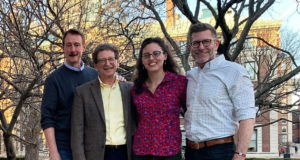WATCH: NYC LGBT Historic Sites Project Receives Prestigious Trustees’ Award from the National Trust for Historic Preservation
November 5, 2022
 The NYC LGBT Historic Sites Project is thrilled and honored to share that our work to identify and document NYC’s place-based LGBT history was honored by the National Trust for Historic Preservation Friday, November 4th, with their Trustees’ Award for Organizational Excellence, one of our field’s highest honors. The award was given at the PastForward Conference, in a ceremony hosted by old house icon Bob Vila.
The NYC LGBT Historic Sites Project is thrilled and honored to share that our work to identify and document NYC’s place-based LGBT history was honored by the National Trust for Historic Preservation Friday, November 4th, with their Trustees’ Award for Organizational Excellence, one of our field’s highest honors. The award was given at the PastForward Conference, in a ceremony hosted by old house icon Bob Vila.
“Each year at the PastForward Conference we come together to recognize those making a real difference in historic preservation. This year’s recipients embody not just the preservation of American history, but also demonstrate how preserving historic places can play a key role in addressing critical issues of today, including climate change, equality, and housing.” — Paul Edmondson, president and CEO of the National Trust for Historic Preservation
Since its founding in 2015, the Project has now identified, researched and mapped over 400 sites across New York City’s five boroughs which connect the public viscerally to the places — residences, bars and venues, public spaces, and more — where LGBT people have contributed to American culture.
About the Trust’s selection of the Project for the 2022 Trustees’ Award for Organizational Excellence: The NYC LGBT Historic Sites Project is a nationally-recognized and influential cultural heritage initiative and educational resource that identifies and documents diverse extant LGBT sites from the 17th century to 2000. The only permanent organization of its kind in the US, the project staff have created an interactive website, National Register nominations, publications and public programs, and school educational materials, among other resources. Sitting at the intersection of historic preservation and social justice, the organization has been particularly eager to document LGBT sites associated with women and Black, Asian, Latinx, trans, and gender-variant communities. In the near future, they hope to prioritize local sites of LGBT history associated with Indigenous and Two Spirit Peoples.